Mark Richards: scientist, mentor, entrepreneur, DJ

Dr Mark Richards is a Senior Teaching Fellow in Physics and leads outreach activities in the Department. He is also a technology entrepreneur and DJ.
Traditionally, the summer is seen as a relatively quiet period for academics − with the pause in teaching and pastoral duties allowing some much needed reflection on research and writing.
But for Dr Mark Richards, things really step up a gear as he puts into action exciting plans for summer schools, work experience programmes and various other outreach activities at Imperial.
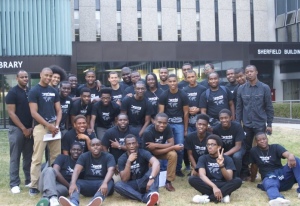
Amos scholars at Imperial
Mark was recently presented with a special recognition award from the Amos Bursary, which supports young men of British African and Caribbean heritage from schools and sixth form colleges across London to gain entry into university. As well as financial assistance, the scheme facilitates access to a range of opportunities including internships, work experience and networking.
“I’ve been involved with Amos since around 2012, at which time there were very few scientist mentors involved in the scheme. I think the charity came to realise more and more of their students were interested in STEM subjects at degree level and so they needed that support.
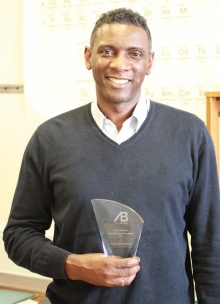 “We’ve now got two Amos bursary recipients currently studying at Imperial, and another starting in October. It’s a great achievement; Imperial was essentially their academic home-from-home while they were studying their A-levels.”
“We’ve now got two Amos bursary recipients currently studying at Imperial, and another starting in October. It’s a great achievement; Imperial was essentially their academic home-from-home while they were studying their A-levels.”
In recognising Mark, the Amos organisation noted the 6 week programme of physics ‘master classes’ he set up to help bring A-level students to a level from which they could apply to top universities.
“There’s no point in selling students false hopes; I don’t think you can have students visiting Imperial and not be equipped for a degree here. The tutored programme was in part aimed at showing them what would be expected of them and giving them a better gauge. It’s often the case that students are averaging a B and the school thinks they are doing well, which they are of course. But there’s another notch that has to be achieved and sometimes state schools just aren’t resourced or equipped to bridge that gap. Independent school generally know how to get a B student to an A, whereas I think a lot of state schools are just happy that students are on track for a B.”
I believe Imperial can be a place for cool students, who don’t intend or want to fit into a particular ilk - It’s not a stuffy place
– Mark Richards
One student that stands out for Mark is Emmanuel Opoku, who is due to start a chemistry degree at Imperial in October. Back in 2012, Emmanuel, who was an Amos bursary recipient, came to visit Imperial to listen to a talk by the Head of NASA Charles Bolden and former ESA Director and Head of Physics at Imperial, Professor David Southwood. From that point on he became absolutely resolved to study at Imperial and after working hard to get the required grades was subsequently offered a place to study Chemistry. However, due to the the government’s fee status definitions he was classified as an overseas student and also unable to access UK student loads and deferred his place for two years. Despite potential opportunities arising in the US, he remained focussed on Imperial and eventually managed to secure scholarship funding for his tuition fees from the TIKO Foundation and crowd-sourced his living costs with the help of a media campaign.
“It says a lot about his character and commitment − but also about Imperial too I think. I’m always keen to attract those students who actually want to come here, so much so that they don’t even bother to apply for Oxford or Cambridge. They make great ambassadors for the College.
“I genuinely believe Imperial can be a place for cool students, who don’t necessarily intend to, or want to, fit into a particular ilk. It’s not a stuffy place and we should be more vocal about that. We simply want to attract the best talent, and you don’t have to be a certain way, apart from being good at what you do.”
Mark has also been heavily involved in Imperial’s pilot Global Summer School, a paid programme for international students; and also a free work experience programme, catering for mostly state school students.
In both programmes pupils are first exposed to cutting edge research at the College along the Faculty lines and then come together to perform group projects and activities based on what they’ve learned. Mark points to a particularly successful exercise in the work experience programme where pairs of students get to interview staff members in different research groups for around half an hour and then produce a poster summarising the research.
“They get a great insight into the research and perhaps more importantly it challenges perceptions as they realise scientists are just ordinary people. It’s that sort of demystifying that will help get more people applying.”
Mark’s long term vision is to set up something akin to a Saturday school, possibly based at Imperial’s new White City Campus, helping to engender community engagement in the area.
Business brain
Mark completed his PhD at Imperial in Atmospheric Physics, specialising in High Resolution Spectroscopic Analysis of Trace Atmospheric Gases. He later applied this expertise when he co-founded Imperial spin-out Duvas Technologies. The company specialises in delivering mobile, wireless air sensing networks to facilitate real-time air pollution mapping.
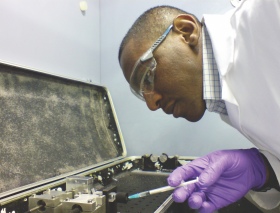 At present air pollution monitoring in the UK is based on a limited number of large fixed modules that cost around £100,000 per unit that are able to monitor over a certain periods of time, with averages taken for say 8hrs or 24hrs then fed into models.
At present air pollution monitoring in the UK is based on a limited number of large fixed modules that cost around £100,000 per unit that are able to monitor over a certain periods of time, with averages taken for say 8hrs or 24hrs then fed into models.
“The problem is that air pollution is very transient in time and space − that’s what our data shows – so if you move just a few yards further away and you’ll get completely difference reading.”
With widespread concerns about the health implications of air pollution among the media and public, particularly in London, there is a clear opportunity for more accurate monitoring technologies to assess the nature of the risk. However, Mark points out that the first step has to come from law makers.
“Even if there is great outcry it doesn’t mean there’s suddenly going to be a rush to buy air quality monitoring equipment. The legislation is based around the best available technology, and so we have to convince the legislators that we now have a better available technology than when the legislation was first brought in. So your task becomes one of influencing air quality experts and key government groups.”
Beat goes on
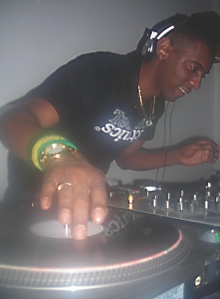 With his Caribbean roots and a youth spent in the vibrant club scenes of Nottingham and Manchester, Mark has always been plugged into music. As a student, Mark spent most of his spare time Djing as DJ Kemist and later founded Xtremix Records, an independent label that provides a remixing service to the music industry.
With his Caribbean roots and a youth spent in the vibrant club scenes of Nottingham and Manchester, Mark has always been plugged into music. As a student, Mark spent most of his spare time Djing as DJ Kemist and later founded Xtremix Records, an independent label that provides a remixing service to the music industry.
“There was a time when I used to supply record shops across London with pressed vinyl we had produced independently. It was on a sale or return basis and then it was clear what the business model was. It wasn’t hugely lucrative, but it was a lot of fun and you make a lot of contacts.”
With music migrating en masse to digital form, Marks says there’s little point in pressing vinyl other than for novelty value, and unless you have some deal with Apple or Amazon it’s considerably harder to get business traction. There are some upsides though, as he explains.
“It’s empowered you to become more experimental because you can obtain music easier and also the technology has stepped up, such that if I have a remix in my head I can immediately test it out on my laptop to see if it might work. Back in the day I had to go to record shops to buy acapellas and then test them using turntables. So it’s easier to experiment but harder to make money!”
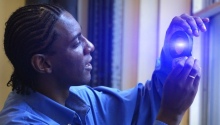 Mark also draws upon his musical side in some of his outreach programmes with an exercise called “working with waves” which essentially explains the physics behind remixing music. The really valuable lesson is that it shows students that you can push the creative envelope by having a strong technical base.
Mark also draws upon his musical side in some of his outreach programmes with an exercise called “working with waves” which essentially explains the physics behind remixing music. The really valuable lesson is that it shows students that you can push the creative envelope by having a strong technical base.
“Some people still believe you must choose to go down an arts route or a technical route, but I’ve always been against that dichotomy. They’re often complementary.”
Article text (excluding photos or graphics) © Imperial College London.
Photos and graphics subject to third party copyright used with permission or © Imperial College London.
Reporter
Andrew Czyzewski
Communications Division